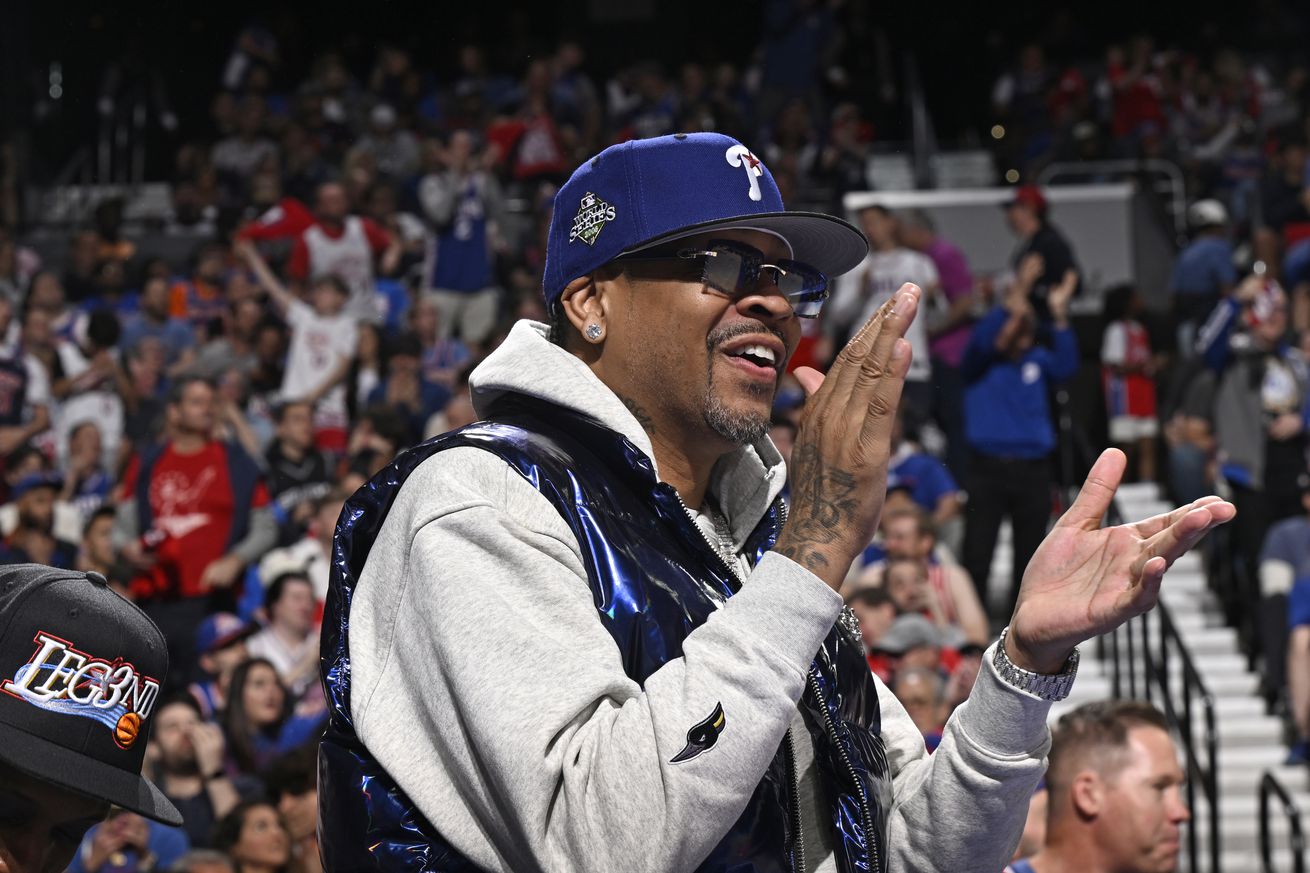
Allen Iverson, a Sixers legend and basketball icon, recently celebrated his 50th birthday.
Allen Iverson turned 50 recently. That’s right, we talkin’ about middle age. Not his prime. Not his prime. Not his prime. Middle age. I mean, how silly is that?
He remains the most compelling figure in Sixers history, a terrific player who emerged as an influencer before anybody knew what that was. Think about it: How many tats and cornrows did you see before AI came along? He made both commonplace, both mainstream.
He played recklessly and lived recklessly. We couldn’t bear to watch. We couldn’t help but watch. And if the odds sometimes seemed stacked against him reaching this birthday, here he is, still synonymous with the team that employed him for over a decade. Still parked on the sidelines at big games, drawing visits from star players and huge ovations whenever the in-house camera pans to him.
His playing career flew by, much like he did. He made nine All-Star teams here, won four scoring titles, earned an MVP and led the Sixers to the 2001 Finals, the last time they advanced that far. They even stole the opener from the Lakers in Los Angeles, a game remembered for Iverson’s stepover on Tyronn Lue.
It was also the game in which Iverson, amid a 48-point masterpiece, went hurtling downcourt at one point, leaving friend and foe in his wake and legendary play-by-play voice Marv Albert breathless: “Iverson, playing at a DIFFERENT SPEED than everyone else.”
He did that a lot. He was relentless, fearless, tireless. If a logo were fashioned of him — one equivalent to the NBA’s Jerry West silhouette or Michael Jordan’s Jumpman — it would show AI splayed on the apron of the court, arms and legs every which way, after being knocked flat on another hell-bent drive to the tin.
But he always seemed to get back up, always kept coming.
Debate if you must whether he was the greatest player in franchise history. (Personally, I believe that is Julius Erving, but there are also Wilt, Moses and the Chuckster to consider. And if you want to go way back, Dolph Schayes.)
Debate whether Iverson could have shared the ball more or, yes, practiced more. And debate, surely, whether he always made the proper life choices. But his imperfections made him the perfect Philly sports hero.
“Iverson probably sold more season tickets than Wilt and Julius,” former Sixers general manager Pat Williams told me, years before his death in 2024. “There was a great love affair with him. He was everybody’s rascal, Peck’s Bad Boy. He was always in trouble with the teacher. He stirred people’s emotions. Nobody was ever neutral with him.”
Iverson’s legacy is built as much on style as substance. Yes, he scored a ton, but we were captivated by the snapshots, by the moments. By not only the Lue play but the crossover against MJ (and never mind that it came amid a loss in AI’s 24-58 rookie season) and the “practice” rant (and never mind that it came at the end of a dispiriting ‘01-02 season).
Playing alongside him was, well, complicated. Certainly he played hard. Certainly he was headstrong, always believing his way was the right way. An example: Former Sixers center Todd MacCulloch once told me that Iverson walked up to him before a game and informed him he was feeling great.
“Think I’m gonna go for 48 tonight,” he told MacCulloch.
MacCulloch (career scoring average: 6.1) could only chuckle.
“Think I’m gonna go from four to eight tonight,” he deadpanned.
Matt Harpring, who spent that ‘01-02 season with the Sixers, once told me about the conflicting emotions that resulted from sharing the court with Iverson. Yes, it was frustrating that AI was always “the first, second and third option” at the offensive end, as Harpring put it, but you learned to live with it, while coming to appreciate Iverson’s competitiveness.
“He’s a popcorn popper’s player,” Harpring said. “When the popcorn was popping, he was ready. It didn’t matter what he did, 12 hours beforehand or (in) practice or whatever. When that ball went up, that guy was ready to play. He was focused in. Never wanted to come out of the game. Played through pain. Played hurt. And I just enjoyed it. I love when guys put their heart and soul into things.”
That’s how he has come to be seen, for the most part. The bad memories have been cast aside, along with any worries about his financial well-being. (Reports indicate that Reebok pays him $800,000 a year, and will give him a $32 million bonus in 2030). In our mind’s eye, he will always be playing at a different speed than everybody else. And if it once seemed he was headed for one of those nasty spills, it is now clear that there were many who were poised to pick him up and carry him shoulder-high, through middle age and beyond.
